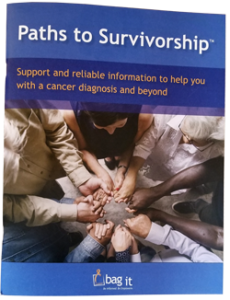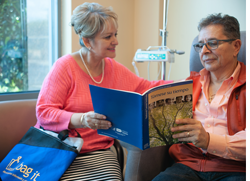What is Self-Advocacy and why is it important?
 Self-advocacy is taking a proactive approach to being part of your healthcare team to ensure your needs are met and you are more in control to live your best life possible with cancer. It includes learning how to educate yourself with reliable information, knowing your rights, listening, and asking the right questions to make sound decisions. Being able to clearly communicate with others and feeling comfortable in making yourself heard are important. Reaching out to others when you need help is another form of self-advocacy and self-respect.
Self-advocacy is taking a proactive approach to being part of your healthcare team to ensure your needs are met and you are more in control to live your best life possible with cancer. It includes learning how to educate yourself with reliable information, knowing your rights, listening, and asking the right questions to make sound decisions. Being able to clearly communicate with others and feeling comfortable in making yourself heard are important. Reaching out to others when you need help is another form of self-advocacy and self-respect.
Bag It’s NEW publication Paths to Survivorship and other contents in your bag guide you on how to advocate for yourself from the moment of diagnosis and beyond.
How to Advocate for Yourself:

- Use your Bag It My Companion Guidebook to organize and track your own information. It’s a handy reference and a good back up if something gets lost. Request copies of your records, labs and test results at every appointment. Store them in the 3-ring guidebook with the most recent on top.
- Write down your questions before your appointment and then write down the answers.
- Bring someone with you to every appointment. A second pair of ears is helpful. They can take notes or record what’s said (ask permission first).
- Visit only reliable websites for cancer information. See Bag It’s resource page for more than 150 websites.
Resource topics include:
- Types of Cancer
- Clinical Trials
- Side-Effects
- Survivorship
- Caregivers and Family Resources
- Parenting and Fertility
- Supportive Care—Emotional Support, Palliative Care, Complementary & Integrative Therapies
- Insurance, Managing Costs, and Financial Assistance
- Legal Rights, Workplace, Advance Care Planning
- Resources in Spanish
 If you were recently diagnosed:
If you were recently diagnosed:
- Assemble and work closely with all the members of your healthcare team.
- Learn about your cancer diagnosis and treatment options with potential side effects to help you make informed decisions about your treatment and care. Consider getting a second opinion.
- Use the My Appointments Summary Log found in My Companion Guidebook to write down your questions in advance of appointments. Make sure you fully understand the answers provided and take notes.
- Bring someone with you to every appointment, especially at the beginning.
- Express fully and honestly what you need and want—to your healthcare team, caregivers, family members, and friends.
- Watch our short “How to use the Bag It bag” video.


Recent Comments